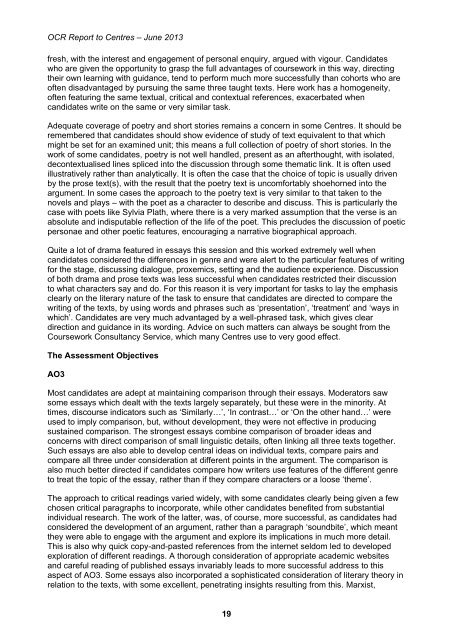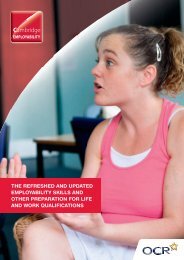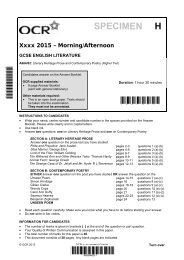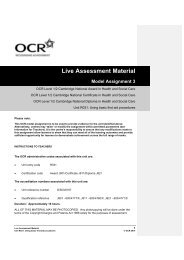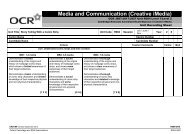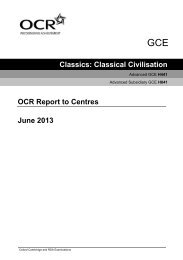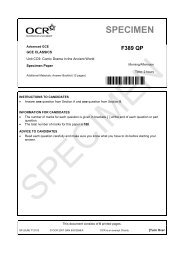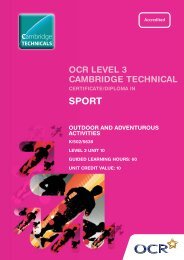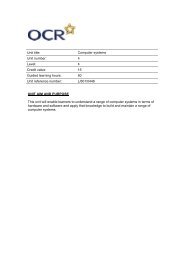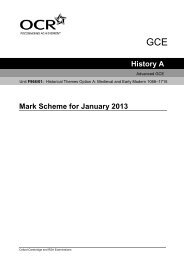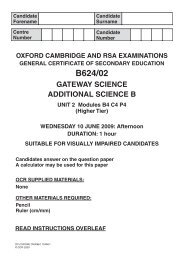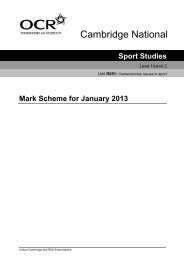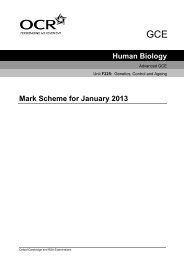Examiners' reports - June (PDF, 385KB) - OCR
Examiners' reports - June (PDF, 385KB) - OCR
Examiners' reports - June (PDF, 385KB) - OCR
Create successful ePaper yourself
Turn your PDF publications into a flip-book with our unique Google optimized e-Paper software.
<strong>OCR</strong> Report to Centres – <strong>June</strong> 2013<br />
fresh, with the interest and engagement of personal enquiry, argued with vigour. Candidates<br />
who are given the opportunity to grasp the full advantages of coursework in this way, directing<br />
their own learning with guidance, tend to perform much more successfully than cohorts who are<br />
often disadvantaged by pursuing the same three taught texts. Here work has a homogeneity,<br />
often featuring the same textual, critical and contextual references, exacerbated when<br />
candidates write on the same or very similar task.<br />
Adequate coverage of poetry and short stories remains a concern in some Centres. It should be<br />
remembered that candidates should show evidence of study of text equivalent to that which<br />
might be set for an examined unit; this means a full collection of poetry of short stories. In the<br />
work of some candidates, poetry is not well handled, present as an afterthought, with isolated,<br />
decontextualised lines spliced into the discussion through some thematic link. It is often used<br />
illustratively rather than analytically. It is often the case that the choice of topic is usually driven<br />
by the prose text(s), with the result that the poetry text is uncomfortably shoehorned into the<br />
argument. In some cases the approach to the poetry text is very similar to that taken to the<br />
novels and plays – with the poet as a character to describe and discuss. This is particularly the<br />
case with poets like Sylvia Plath, where there is a very marked assumption that the verse is an<br />
absolute and indisputable reflection of the life of the poet. This precludes the discussion of poetic<br />
personae and other poetic features, encouraging a narrative biographical approach.<br />
Quite a lot of drama featured in essays this session and this worked extremely well when<br />
candidates considered the differences in genre and were alert to the particular features of writing<br />
for the stage, discussing dialogue, proxemics, setting and the audience experience. Discussion<br />
of both drama and prose texts was less successful when candidates restricted their discussion<br />
to what characters say and do. For this reason it is very important for tasks to lay the emphasis<br />
clearly on the literary nature of the task to ensure that candidates are directed to compare the<br />
writing of the texts, by using words and phrases such as ‘presentation’, ‘treatment’ and ‘ways in<br />
which’. Candidates are very much advantaged by a well-phrased task, which gives clear<br />
direction and guidance in its wording. Advice on such matters can always be sought from the<br />
Coursework Consultancy Service, which many Centres use to very good effect.<br />
The Assessment Objectives<br />
AO3<br />
Most candidates are adept at maintaining comparison through their essays. Moderators saw<br />
some essays which dealt with the texts largely separately, but these were in the minority. At<br />
times, discourse indicators such as ‘Similarly…’, ‘In contrast…’ or ‘On the other hand…’ were<br />
used to imply comparison, but, without development, they were not effective in producing<br />
sustained comparison. The strongest essays combine comparison of broader ideas and<br />
concerns with direct comparison of small linguistic details, often linking all three texts together.<br />
Such essays are also able to develop central ideas on individual texts, compare pairs and<br />
compare all three under consideration at different points in the argument. The comparison is<br />
also much better directed if candidates compare how writers use features of the different genre<br />
to treat the topic of the essay, rather than if they compare characters or a loose ‘theme’.<br />
The approach to critical readings varied widely, with some candidates clearly being given a few<br />
chosen critical paragraphs to incorporate, while other candidates benefited from substantial<br />
individual research. The work of the latter, was, of course, more successful, as candidates had<br />
considered the development of an argument, rather than a paragraph ‘soundbite’, which meant<br />
they were able to engage with the argument and explore its implications in much more detail.<br />
This is also why quick copy-and-pasted references from the internet seldom led to developed<br />
exploration of different readings. A thorough consideration of appropriate academic websites<br />
and careful reading of published essays invariably leads to more successful address to this<br />
aspect of AO3. Some essays also incorporated a sophisticated consideration of literary theory in<br />
relation to the texts, with some excellent, penetrating insights resulting from this. Marxist,<br />
19


